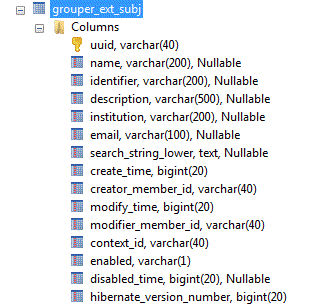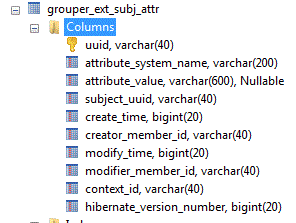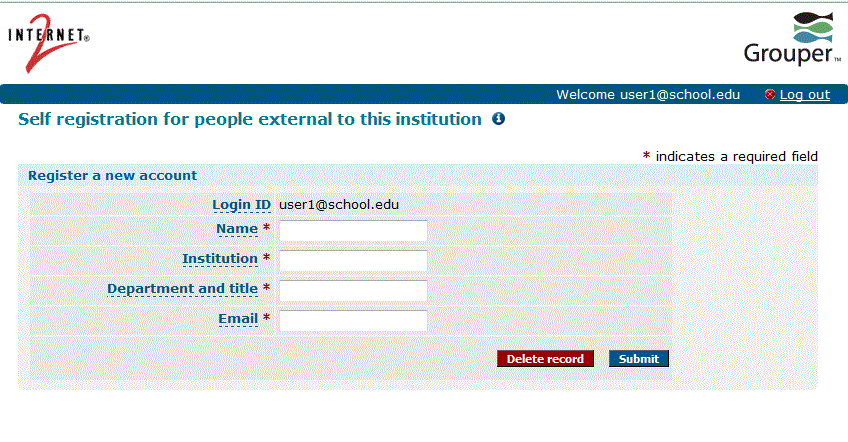In order for Grouper to be used in a Federated environment, external subjects must be able to be fed into a subject source. In this case federated or external is similar, but the intent is that the subject id would be an eppn (whether or not the IdP's are in a federation). However, the subject id's do not have to be an eppn, but they do need to be unique in the source. This should be handled by an Identity management system, though generally it is not. So to prevent many institutions from having to create their own custom process, Grouper will have a built-in that can be used. Note, a custom or IdM solution could be used instead, or it could be disabled entirely. COmanage has a solution for this, and this solution is similar to theirs.
The enhancement to Grouper will consist of a few DB tables, and some UI screens. Users will self register (perhaps from an invite).
There is another possibility of allowing admins to just enter the subjectId and attributes of external users, but with a link we know it is valid. It is difficult to know what the user id will be until they login to the UI screen. With the effort it takes to email someone and ask them for a response, they could just click on
a link and register.
Data model
Grouper will have two tables similar to the quickstart subject tables which are:
Configuration
grouper.properties
#####################################
## External subjects
#####################################
externalSubjects.desc.el = ${grouperUtil.appendIfNotBlankString(externalSubject.name, ' - ', externalSubject.institution)}
# true if the description should be managed via EL (config above)
externalSubjects.desc.manual = false
# quartz cron where subjects are recalculated if necessary (empty means dont run), e.g. everyday at 3am
externalSubjects.calc.fields.cron = 0 0 3 * * ?
externalSubjects.name.required = true
externalSubjects.email.required = false
externalSubjects.email.enabled = true
# these field names (uuid, institution, identifier, uuid, email, name) or attribute names
# will be toLowered, and appended with comma separators
externalSubjects.searchStringFields = name, institution, identifier, uuid, email, jabber
externalSubjects.institution.required = false
externalSubjects.institution.enabled = true
# this can change, and is shown on screen
externalSubjects.attributes.jabber.friendlyName = Jabber ID
# note, this must be only alphanumeric lower case or underscore
# (valid db column name, subject attribute name)
externalSubjects.attributes.jabber.systemName = jabber
externalSubjects.attributes.jabber.required = false
# comment on column in DB (no special characters allowed)
externalSubjects.attributes.jabber.comment = The jabber ID of the user
# if wheel or root can edit external users
externalSubjects.wheelOrRootCanEdit = true
# group which is allowed to edit external users
externalSubjects.groupAllowedForEdit =
# if the view on the external subjects should be created.
# turn this off if it doesnt compile, othrewise should be fine
externalSubjects.createView = true
# grouper can auto create a jdbc2 source for the external subjects
externalSubjects.autoCreateSource = true
# put in fully qualified classes to add to the EL context. Note that they need a default constructor
# comma separated. The alias will be the simple class name without a first cap.
# e.g. if the class is test.Test the alias is "test"
externalSubjects.customElClasses =
# change these to affect the storage where external subjects live (e.g. to store in ldap),
# must implement each respective storable interface
externalSubjects.storage.ExternalSubjectStorable.class = edu.internet2.middleware.grouper.externalSubjects.ExternalSubjectDbStorage
externalSubjects.storage.ExternalSubjectAttributeStorable.class = edu.internet2.middleware.grouper.externalSubjects.ExternalSubjectAttributeDbStorage
Built in field metadata
The built in subject fields can be enabled/disabled or required or not. Things like email are in the subject table since they might be common in deployments.
externalSubjects.name.required = true externalSubjects.email.required = false externalSubjects.email.enabled = true externalSubjects.institution.required = false externalSubjects.institution.enabled = true
External subject attributes
Grouper will allow configuration of which external subject attributes to keep for all external users. E.g. phone, email, jabber, firstName, lastName, etc. This will be in the grouper.properties. You can configure the friendly name, comment, if required, etc
# this can change, and is shown on screen externalSubjects.attributes.jabber.friendlyName = Jabber ID # note, this must be only alphanumeric lower case or underscore # (valid db column name, subject attribute name) externalSubjects.attributes.jabber.systemName = jabber externalSubjects.attributes.jabber.required = false # comment on column in DB (no special characters allowed) externalSubjects.attributes.jabber.comment = The jabber ID of the user
Pluggability
This should use the Grouper UI pluggable authenticator so that Shib or non-Shib authentication would work or would be pluggable.
The storage needs to be pluggable also so someone could use a different storage e.g. ldap. Implement the external subject storable interfaces (one for subject, one for attribute). The built in implementation just call the Grouper DAO to store in the Grouper DB
# change these to affect the storage where external subjects live (e.g. to store in ldap), # must implement each respective storable interface externalSubjects.storage.ExternalSubjectStorable.class = edu.internet2.middleware.grouper.externalSubjects.ExternalSubjectDbStorage externalSubjects.storage.ExternalSubjectAttributeStorable.class = edu.internet2.middleware.grouper.externalSubjects.ExternalSubjectAttributeDbStorage
Here are examples of the interfaces:
package edu.internet2.middleware.grouper.externalSubjects;
import java.util.Set;
import edu.internet2.middleware.grouper.internal.dao.QueryOptions;
/**
* implement this to change how external subjects are stored
* @author mchyzer
*/
public interface ExternalSubjectStorable {
/**
* find all external subjects which have a disabled date which are not disabled
* @return the set of subjects
*/
public Set<ExternalSubject> findAllDisabledMismatch();
/**
* find all external subjects
* @return the set of subjects
*/
public Set<ExternalSubject> findAll();
/**
* find an external subject by identifier
* @param identifier
* @param exceptionIfNotFound
* @param queryOptions
* @return the external subject or null or exception
*/
ExternalSubject findByIdentifier(String identifier, boolean exceptionIfNotFound, QueryOptions queryOptions);
/**
* delete an external subject and all its attributes
* @param externalSubject
*/
void delete(ExternalSubject externalSubject);
/**
* insert or update an external subject to the DB
* @param externalSubject
*/
void saveOrUpdate( ExternalSubject externalSubject );
}
package edu.internet2.middleware.grouper.externalSubjects;
import java.util.Set;
import edu.internet2.middleware.grouper.internal.dao.QueryOptions;
/**
* implement this to change how external subjects are stored
* @author mchyzer
*/
public interface ExternalSubjectStorable {
/**
* find all external subjects which have a disabled date which are not disabled
* @return the set of subjects
*/
public Set<ExternalSubject> findAllDisabledMismatch();
/**
* find all external subjects
* @return the set of subjects
*/
public Set<ExternalSubject> findAll();
/**
* find an external subject by identifier
* @param identifier
* @param exceptionIfNotFound
* @param queryOptions
* @return the external subject or null or exception
*/
ExternalSubject findByIdentifier(String identifier, boolean exceptionIfNotFound, QueryOptions queryOptions);
/**
* delete an external subject and all its attributes
* @param externalSubject
*/
void delete(ExternalSubject externalSubject);
/**
* insert or update an external subject to the DB
* @param externalSubject
*/
void saveOrUpdate( ExternalSubject externalSubject );
}
Calculated fields
Some fields are or can be calculated. The search string (string where subject searches are based on) is based on certain fields, and the description can be based on expression language. These calculations will be recalculated whenever a subject is changed (or attributes), or when the daemon runs.
externalSubjects.desc.el = ${grouperUtil.appendIfNotBlankString(externalSubject.name, ' - ', externalSubject.institution)}
# true if the description should be managed via EL (config above)
externalSubjects.desc.manual = false
# these field names (uuid, institution, identifier, uuid, email, name) or attribute names
# will be toLowered, and appended with comma separators
externalSubjects.searchStringFields = name, institution, identifier, uuid, email, jabber
For the expression language, you can add cuatom classes
# put in fully qualified classes to add to the EL context. Note that they need a default constructor # comma separated. The alias will be the simple class name without a first cap. # e.g. if the class is test.Test the alias is "test" externalSubjects.customElClasses =
Built in subject source
Grouper can auto create a jdbc subject source 2 view for the subjects and attributes, and it can auto create a source for that view. Or you can disabled that and do it yourself.
# if the view on the external subjects should be created. # turn this off if it doesnt compile, othrewise should be fine externalSubjects.createView = true # grouper can auto create a jdbc2 source for the external subjects externalSubjects.autoCreateSource = true
The view will look like this (depending on which fields and attributes are enabled/included):
CREATE VIEW grouper_ext_subj_v (uuid, name, identifier, description, institution, email, search_string_lower, jabber) AS SELECT ges.uuid, ges.name, ges.identifier, ges.description , ges.institution , ges.email , ges.search_string_lower , (SELECT gesa.attribute_value FROM grouper_ext_subj_attr gesa WHERE gesa.subject_uuid = ges.uuid AND gesa.attribute_system_name = 'jabber' ) AS jabber FROM grouper_ext_subj ges WHERE ges.enabled = 'T';
The auto created source does not need anything in the sources.xml and will map to the above view with the jdbc2 source adapter which allows for more intelligent searching (put in a phrase, and any string in the phrase.cna be anywhere in the search string will match a subject)
External user security
Wheel or root can be enabled to edit external subjects, or a group can be configured:
# if wheel or root can edit external users externalSubjects.wheelOrRootCanEdit = true # group which is allowed to edit external users externalSubjects.groupAllowedForEdit =
Enabled/disabled subjects
External subjects can have expire dates. These dates work like membership delete dates where the disabledDate daemon will check for deltas and update the enabled flag.
Calculated fields daemon
There is a daemon which runs in the grouper-loader on a cron which will recalculate the calculated fields (e.g. nightly). This needs to be done if the configuration changes, or if data changes without recalculating (not sure why this would happen). Just set the quartz cron in the grouper.properties
# quartz cron where subjects are recalculated if necessary (empty means dont run), e.g. everyday at 3am externalSubjects.calc.fields.cron = 0 0 3 * * ?
GSH commands
These commands can create, edit, and delete external subjects
gsh 0% grouperSession = GrouperSession.startRootSession();
edu.internet2.middleware.grouper.GrouperSession: 552eb161e98f47c4b98876528e36a409,'GrouperSystem','application'
//create a new external subject
gsh 1% externalSubject = new ExternalSubject();
edu.internet2.middleware.grouper.externalSubjects.ExternalSubject:
gsh 2% externalSubject.setIdentifier("abcd@school.edu");
gsh 3% externalSubject.setInstitution("My Institution");
gsh 4% externalSubject.setName("My Name");
gsh 5% externalSubject.setEmail("a@b.c");
gsh 6% externalSubject.store();
//assign an attribute
gsh 7% externalSubject.assignAttribute("jabber", "e@r.t");
true
//find the object to edit it
gsh 8% externalSubject = GrouperDAOFactory.getFactory().getExternalSubject().findByIdentifier("abcd@school.edu", true, null);
edu.internet2.middleware.grouper.externalSubjects.ExternalSubject: uuid: 759cf0f0b6874cef886a4f3138244125, identifier: abcd@school.edu, name: My Name, description: My Name - My Institution,
//search by subject in grouper by the subject api
gsh 9% subject = SubjectFinder.findByIdentifier("abcd@school.edu", true);
subject: id='759cf0f0b6874cef886a4f3138244125' type='person' source='grouperExternal' name='My Name'
gsh 10% subject.getName();
My Name
//edit the external subject
gsh 11% externalSubject.setName("My Name2");
gsh 12% externalSubject.store();
//find by any substring of the subject
gsh 14% subject = SubjectFinder.findAll("naMe2 mY INSTITUTION").iterator().next();
subject: id='759cf0f0b6874cef886a4f3138244125' type='person' source='grouperExternal' name='My Name2'
//note that all attributes are exposed by the subject api
gsh 15% subject.getAttributeValue("jabber");
e@r.t
//delete the external subject
gsh 16% externalSubject.delete();
//note its not there
gsh 17% subject = SubjectFinder.findByIdentifier("abcd@school.edu", false);
gsh 18%
Self service screen
The fields below can be customized per institution, as well as the text, look and feel, etc. Some applications might require a lot of user data, and others do not need as much data about the user. It would be nice to have a lot of data, e.g. so the application can use the data (e.g. email address), and so we can have descriptive person pickers, though it is a little risky since the data is user entered and unvetted.
URLs and servlets
There is a new external servlet so that external users can be protected by Shib (or whatever), and the rest of the UI can be protected by a local singl sign on system. Or both. Or you could run the UI twice. The URL of the external part is e.g.
http://localhost:8090/grouper/grouperExternal/appHtml/grouper.html?operation=ExternalSubjectSelfRegister.externalSubjectSelfRegister
All the ajax is in grouperExternal. The admin UI is all struts do's and jsp's. The lite UI is in grouper/grouperUi/etc. You cannot access the admin console, or lite UI from the external URL and vise versa. Note there is a new servlet mapping and filter mapping in the web.xml
Setup on the demo server
- Turn off the UI default basic auth in the web.xml by commenting out the security sections in web.core.xml and web.ajax.xml
- Shibbolize the app, except for the external part
#match anything that is not grouperExternal <LocationMatch /grouper_v2_0[^/]*/(?!grouperExternal/).*> AuthType shibboleth ShibRequestSetting requireSession 1 require valid-user </LocationMatch>
- See that you are prompted for shib authn here:https://grouperdemo.internet2.edu/grouper_v2_0_0/
- But you are not prompted for shib authn here:https://grouperdemo.internet2.edu/grouper_v2_0_0/grouperExternal/appHtml/grouper.html?operation=ExternalSubjectSelfRegister.index
Admin console
There could be an admin screen where certain groups of users could add/edit users. There could be a delete screen to delete users. There could also be a time to live on users for admins to set.
How to change your login ID
For example, if a user is not a member of the federation, and signs up at protect network, uses services, and then later on their home institution becomes a member of incommon, a Grouper admin could edit the "identifier" attribute of the user via GSH or SQL. This will keep the memberships of the user intact, but allow them to log in with the new ID.
Allowed to register?
This paramter affects if a user is allowed to register their information
From grouper.properties
#if registrations are only allowed if invited or existing... externalSubjects.registerRequiresInvite=true
Invite required? |
Invite UUID in URL? |
User previously registered (edit not insert)? |
Error message? |
Result |
|---|---|---|---|---|
F |
F |
F |
F |
Continue to screen |
F |
F |
T |
F |
Continue to screen |
F |
Invalid UUID |
F |
T |
Continue to screen |
F |
Invalid UUID |
T |
T |
Continue to screen |
F |
Valid UUID |
F |
F |
Continue to screen |
F |
Valid UUID |
T |
F |
Continue to screen |
T |
F |
F |
T |
Do NOT continue to screen |
T |
F |
T |
T |
Continue to screen |
T |
Invalid UUID |
F |
T |
Do NOT continue to screen |
T |
Invalid UUID |
T |
T |
Continue to screen |
T |
Valid UUID |
F |
F |
Continue to screen |
T |
Valid UUID |
T |
F |
Continue to screen |
sda
Phase 1: self registration / maintenance
The Grouper UI will have a screen where external users can add or edit their information. Note, once they click on the link, they will have registered, and they token will be deleted from the database. Then they can edit their attributes (whatever attributes are available per the config of the Grouper administrator). This screen will be protected by the federated authentication service provider. Certain attributes can be prepopulated from the authentication system.
There will be an invite only option where if enabled will only allow external subjects in if they have been invited by email address. Multiple email addresses should be able to be inputted at once. This will require a token table:
GROUPER_EXT_SUBJ_TOKEN
uuid: varchar(40)
emailAddress: varchar(100): email address sent to
emailAddressToNotify: varchar(100): email address to notify
hibernateVersionNumber: number
lastUpdated: number of millis since 1970
A screen (that can be protected by a certain group) will allow email addresses in a textarea, and a message to the users, and a form email will be sent with a link back to the UI to register with the token. Tokens wil expire after a configurable amount of time. There can be a checkbox and textfield which causes a notification to the person who invited the external users when they register.
Admins will be able to search for external subjects with the UI. If they need to make edits, at this point they can do that in the DB directly. At some point we should have an admin screen for them.
Phase 2: invites with group provisioning
This is Steven Carmody's idea. We could add a table:
GROUPER_EXT_SUBJ_TOKEN_GROUP
uuid: varchar(40)
token_id: foreign key from above
group_id: foreign key to grouper groups
hibernateVersionNumber: number
lastUpdated: number of millis since 1970
Then there can be a picker to allow the person inviting the external subjects to mark them to be added to group(s) once they register. Note the security will be checked at the invite time, there is no actAs once the users register. This information should be put in the email to the inviter (if applicable). At some point we could do something similar for permissions as well.
To do
- More metadata on attributes (e.g. length)
- Add multiple search strings and sort fields based on new member columns


